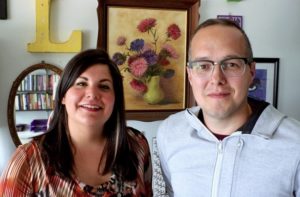Anishinaabe associate professors among seven to receive funding for research projects

By Rick Garrick
THUNDER BAY — Videos on land-based programming are being created for a Lakehead University Indigenous food sovereignty research project funded by the Canadian Institutes of Health Research (CIHR).
Lana Ray, assistant professor in Indigenous Learning at Lakehead University and Red Rock Indian Band citizen, received $142,211 for the project, which was one of seven Lakehead University projects that received more than $742,000 in CIHR funding. Christopher Mushquash, an associate professor in Lakehead University’s Department of Psychology and the Northern Ontario School of Medicine and a Pays Plat citizen, also received $160,000 along with Dilico Anishinabek Family Care to develop a group intervention strategy for First Nations children and youth.
“We wanted to make sure for our project we weren’t just looking at what is there in the academic literature,” Ray says, noting that the videos will focus on ricing in a Treaty #3 community and a community hunt organized by the Shkagamik-Kwe Health Centre in Sudbury. “We are also very much positioning what our Elders and knowledge holders are saying as our theory to make those connections between land and health. So in addition to the case study programs, we are also doing videos of knowledge holders and what they are saying about the importance of that connection and food and for us to have sovereignty or self-governing over our food and relationships with land.”
Ray’s project is about creating an Indigenous food sovereignty best practice framework to use for designing, implementing and evaluating health interventions for Indigenous peoples accessing services in northern Ontario’s urban and rural communities.
“At a community level, this project will examine the effectiveness of moving from an outcome-based approach to one that is focused on the ways in which health is negotiated and lived among Indigenous peoples according to an Indigenous model of health, and thus an understanding of health that is culturally-based,” Ray says.
Ray is working with principal knowledge holder Joe LeBlanc, director of Indigenous Affairs at the Northern Ontario School of Medicine, co-applicants Kristin Burnett and Barbara Parker, and knowledge users Anita Cameron and Perry McLeod-Shabogesic, on the Indigenous food sovereignty research project.
Mushquash, who is Canada Research Chair in Indigenous Mental Health and Addiction and a psychologist at Dilico, is working with principal applicant-knowledge user John Dixon, director of mental health and addiction services at Dilico, co-applicant-trainee Kristy Kowatch, and collaborators-knowledge users Tina Bobinski and Kristine Stasiuk on the group intervention strategy research project.
“Our project is a four-year project that is looking at developing a group-based intervention for First Nations young people who are experiencing difficulties in a number of different areas that are sort of related to other mental health conditions,” Mushquash says. “Our approach is a technical term, but it is looking at what some of the underlying factors of some of those difficulties might be, so for example ability to regulate emotions in a way that is helpful for one’s self.”
Dixon says Dilico’s role in the project is to meet the clinical needs of the service population in a way that honours “our strengths as a people.” He emphasizes that the focus is on Anishinabek beliefs, spirituality and community relations.
“Research is only undertaken if it is wanted by the community and is of benefit to communities in terms of immediate knowledge translation, and the advancement of community wellness,” Dixon says. “It is our expectation that training and service delivery models will be developed from this work that will further enhance Indigenous models of care.”


